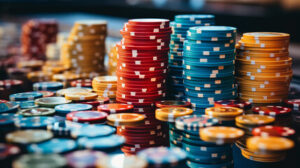Home » Posts tagged 'corporate training courses'
Tag Archives: corporate training courses
The Importance of Taking a Poker Lesson
Poker is a game of skill that takes an hour to learn and a lifetime to master. If you want to crush your opponents, it is important that you study hard and make better decisions. However, it is also important to remember that results are not everything.
Choosing a good poker coach is crucial for your success. You should look for someone with a solid track record and a history of happy students. Read on Pokertalk for more details.
There is a lot of luck involved in poker, and this is especially true in live tournaments. However, you can improve your luck by learning the game well. This can be done by taking poker lessons from experienced players. These experts can teach you strategies that will help you win more hands. You can also find a lot of poker strategy videos online that will help you learn the game.
Another important aspect of learning poker is understanding the odds of each type of hand. For example, you should know that a royal flush beats a straight and three of a kind beats two pair. You can use this knowledge to estimate your chances of making a winning hand. There are many different ways to calculate poker odds, but the most straightforward is using the “Rule of Two and Four.” This rule estimates your chances by multiplying the number of outs you have by the probability that your opponent has a good one.
Whether you’re looking to get your first taste of no-limit hold’em or want to sharpen your skills to try and win more money, this collection of poker lessons will give you the tools you need. It features expert strategies from top-level poker players including Andrew “LuckyChewy” Lichtenberger, Brian Altman, Tony Dunst, Michael “Gags30” Gagliano, and Johan Schultz-Pedersen. The lessons cover the fundamentals of poker as well as advanced techniques. These include understanding the importance of position and hand strength, determining how much to bet, and knowing when to fold.
Game of skill
Poker is a game of skill, and while luck can sway individual hands, mastery of the game’s strategy determines long-term success. Research by Dedonno and Detterman has shown that players who are given strategic instruction outperform those who receive no training. Moreover, a player’s consistency in winning and losing is also a sign of skill.
Skill in poker starts with a deep understanding of probabilities, which enables players to calculate their chances of getting certain hands and the odds of improving those hands. This allows players to make wise decisions, such as determining whether it is worth calling a high bet with poor cards. Additionally, skilled poker players can read their opponents by interpreting betting patterns and body language.
Another essential aspect of poker is knowing when to fold and when to play. This requires a clear mind and effective bankroll management. Good players track their daily and weekly wins and losses, and they keep a record of the types of games they play. This helps them avoid making mistakes and improve their skills over time. In addition, a good poker player is consistent in their decisions and doesn’t let short-term winnings or losses influence their judgement. This is important, as it enables them to maximise their profits over time.
Game of psychology
Poker psychology is an important aspect of the game, and understanding it can give you a major advantage over your opponents. It can help you read your opponent’s tells, determine whether they are bluffing or not, and how receptive they will be to your bluffing. It also helps you understand their overall emotional state and how that affects their decision-making. When used in tandem with advanced poker strategy, poker psychology can be a powerful tool for winning big.
Understanding the psychology of poker can help you improve your game, even when you have a bad run of cards. The key is to remain focused on the things you can control and avoid getting frustrated with your results. If you can do this, you will find that poker is much more than a game of chance.
There are several ways to improve your poker skills, including playing with friends and limiting how much money you bet. This way, you can avoid losing too much and learn from your mistakes. You can also make your poker experience more exciting by playing with people who share the same interests as you. These strategies will not only increase your enjoyment of the game but will also improve your chances of winning. However, it’s important to remember that no matter how much skill you have, you will still face some luck and bad breaks from time to time.
Game of bluffing
There are many factors that affect the success of a poker bluff. One important factor is the opponent’s reaction to your bluff. Some players will be so angry at being deceived that they will play worse, even if they have a weak hand. This can be a bad thing for you, but it’s also important to know how to read your opponents.
The type of bluff is another factor to consider. Pure bluffs are less likely to win money than semi-bluffs. These are bluffs that are combined with hands that have the potential to improve as the pot develops. These types of bluffs are much more effective. The recent history of your opponent must also be taken into account. If he’s been hammered recently, he will probably play worse to try and get his money back. This makes him a great target for your bluffs.
The table image you have will also play a role in your bluffing success. Tight players will perceive your bets as representing strength, making your bluffs more successful. On the other hand, loose players will be able to call your bluffs more easily. It is also important to avoid telling tells, which can signal that you are bluffing. Some players have involuntary tells, like touching their ears or fidgeting when they’re lying. However, experienced players can reduce their tells over time. This is especially true for MTT players, who can learn to meld exploitative and GTO approaches.
Game of balance
A lot of poker content discusses balancing your range in order to avoid predictable patterns and become less exploitable. However, it seems rarer to see a discussion of what balance actually looks like in a specific setting. In this episode of the Red Chip podcast, coach Fausto Valdez walks host Zac Shaw through a $1/$2 hand to help recreational players understand how to think about their own ranges and the ranges of their opponents.
To balance your range, you must be aware of the types of hands that your opponent has and how often they play those hands. In addition, you should also be aware of the overall game dynamics and your opponent’s relative stack sizes and bet sizes. This will help you determine when to make a move and how much to bet.
Ideally, your bets will be proportional to the size of the pot, so you can maximize your expected value and minimize your risk. However, if you bet too much and your opponent calls your bluffs, it can be detrimental to your bottom line. A good way to avoid this is by making a small bet when you have a strong hand, and increasing your bet size as the pot grows.




